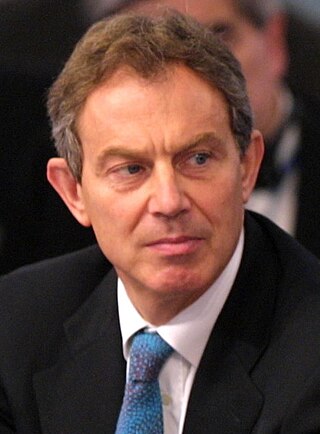
The 2001 United Kingdom general election was held on Thursday 7 June 2001, four years after the previous election on 1 May 1997, to elect 659 members to the House of Commons. The governing Labour Party was re-elected to serve a second term in government with another landslide victory with a 167 majority, returning 412 members of Parliament versus 418 from the 1997 general election, a net loss of six seats, though with a significantly lower turnout than before—59.4%, compared to 71.6% at the previous election. The number of votes Labour received fell by nearly three million. Tony Blair went on to become the only Labour Prime Minister to serve two consecutive full terms in office. As Labour retained almost all of their seats won in the 1997 landslide victory, the media dubbed the 2001 election "the quiet landslide".
The Conservative Party, officially the Conservative and Unionist Party and colloquially known as the Tories, is one of the two main political parties in the United Kingdom, along with the Labour Party. It is the current governing party, having won the 2019 general election, and has been the primary governing party in the United Kingdom since 2010. The party sits on the right-wing to centre-right of the political spectrum. It encompasses various ideological factions including one-nation conservatives, Thatcherites, and traditionalist conservatives. The party holds the annual Conservative Party Conference, at which senior Conservative figures promote party policy.

The 1997 United Kingdom general election was held on Thursday, 1 May 1997. The governing Conservative Party led by Prime Minister John Major was defeated in a landslide by the Labour Party led by Tony Blair, achieving a 179-seat majority.

The 1992 United Kingdom general election was held on Thursday 9 April 1992, to elect 651 members to the House of Commons. The election resulted in the fourth consecutive victory for the Conservative Party since 1979, with a majority of 21 and would be the last time that the Conservatives would win an overall majority at a general election until 2015. It was also the last general election to be held on a day which did not coincide with any local elections until 2017. This election result took many by surprise, as opinion polling leading up to the election day had shown a narrow but consistent lead for the Labour Party under leader Neil Kinnock.
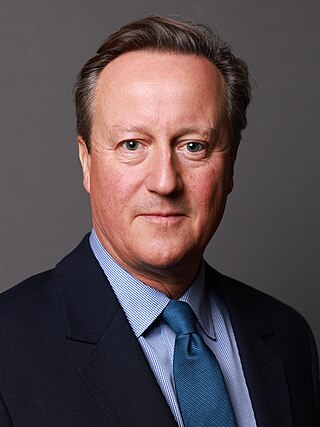
David William Donald Cameron, Baron Cameron of Chipping Norton, is a British politician who has served as Foreign Secretary since 2023. He previously served as Prime Minister of the United Kingdom from 2010 to 2016, as Leader of the Conservative Party from 2005 to 2016, and as Leader of the Opposition from 2005 to 2010, while serving as Member of Parliament (MP) for Witney from 2001 to 2016. He identifies as a one-nation conservative and has been associated with both economically liberal and socially liberal policies.

Andrew Guy Tyrie, Baron Tyrie, is a British politician and former chair of the Competition and Markets Authority. A member of the Conservative Party, he was Member of Parliament (MP) for Chichester from 1997 to 2017. Tyrie was previously a special adviser at HM Treasury and chair of the Treasury Select Committee, having taken up the role on 10 June 2010. He was described by Donald Macintyre of The Independent in 2013 as "the most powerful backbencher in the House of Commons", and by The Economist as a liberal conservative.

Edward Samuel Miliband is a British politician serving as Shadow Secretary of State for Energy Security and Net Zero since 2021. He has been the Member of Parliament (MP) for Doncaster North since 2005. Miliband was Leader of the Labour Party and Leader of the Opposition between 2010 and 2015. Alongside his brother, Foreign Secretary David Miliband, he served in the Cabinet from 2007 to 2010 under Prime Minister Gordon Brown.

The 2010 United Kingdom general election was held on Thursday 6 May 2010, with 45,597,461 registered voters entitled to vote to elect members to the House of Commons. The election took place in 650 constituencies across the United Kingdom under the first-past-the-post system.

Stewart James Jackson, Baron Jackson of Peterborough is a British politician and adviser. Jackson served as a Conservative Member of Parliament (MP) for Peterborough from 2005 to 2017. After being ousted by Labour's Fiona Onasanya at the 2017 general election, he served as Chief of Staff, and Special Adviser to David Davis, Secretary of State for Exiting the European Union, until July 2018 when Davis resigned his position.

Grant Shapps is a British politician serving as Secretary of State for Defence since August 2023. Shapps has previously served in various cabinet posts, including Conservative Party Co-Chairman, Transport Secretary, Home Secretary, Business Secretary, and Energy Secretary under Prime Ministers David Cameron, Boris Johnson, Liz Truss and Rishi Sunak. A member of the Conservative Party, he has been the Member of Parliament (MP) for Welwyn Hatfield since 2005.
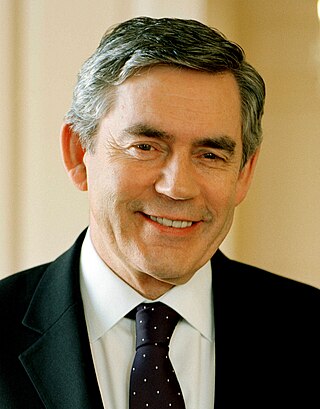
Gordon Brown's term as the prime minister of the United Kingdom began on 27 June 2007 when he accepted an invitation of Queen Elizabeth II to form a government, replacing Tony Blair, and ended on 11 May 2010 upon his resignation. While serving as prime minister, Brown also served as the first lord of the treasury, the minister for the civil service, and the leader of the Labour Party. He and Blair both extensively used the New Labour branding while in office, which was presented as the brand of a newly reformed party that had altered Clause IV and endorsed market economics, though Brown's style of government differed from that of his predecessor. Brown is the most recent Labour politician as well as the most recent Scottish politician to hold the office of prime minister.
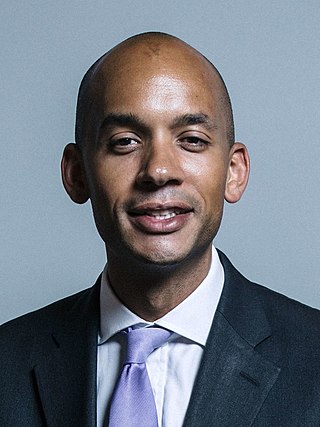
Chuka Harrison Umunna is a British businessman and former politician who served as Member of Parliament (MP) for Streatham from 2010 until 2019. A former member of the Labour Party, he was part of the Shadow Cabinet from 2011 to 2015. He left Labour in February 2019, when he resigned to form The Independent Group, later Change UK, along with six other MPs. Later in 2019, he left Change UK and, after a short time as an independent MP, joined the Liberal Democrats. In the 2019 general election, he was unsuccessful in being re-elected as an MP and did not return to the House of Commons.

Anthony Edward Timpson, is a British politician who was elected as the Member of Parliament (MP) for Eddisbury in Cheshire at the 2019 general election. He is a member of the Conservative Party.

The David Davis by-election campaign of 2008 was a political campaign against the erosion of civil liberties in the United Kingdom, led by the former Conservative Member of Parliament (MP), David Davis, labelled by Davis as the David Davis For Freedom campaign.

The United Kingdom Alternative Vote referendum, also known as the UK-wide referendum on the Parliamentary voting system was held on Thursday 5 May 2011 in the United Kingdom (UK) to choose the method of electing MPs at subsequent general elections. It occurred as a provision of the Conservative–Liberal Democrat coalition agreement drawn up in 2010 and also indirectly in the aftermath of the 2009 expenses scandal. It operated under the provisions of the Parliamentary Voting System and Constituencies Act 2011 and was the first national referendum to be held under provisions laid out in the Political Parties, Elections and Referendums Act 2000.

David Cameron's tenure as Prime Minister of the United Kingdom began on 11 May 2010 when he accepted an invitation from Queen Elizabeth II to form a government, succeeding Gordon Brown of the Labour Party, and ended on 13 July 2016 upon his resignation following the 2016 referendum that favoured Brexit, which he had opposed. As prime minister, Cameron served simultaneously as First Lord of the Treasury and as Minister for the Civil Service.
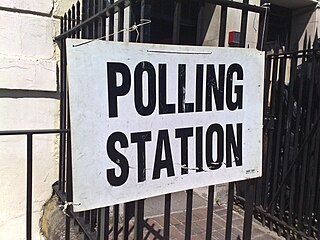
The events surrounding the formation of the United Kingdom's government in 2010 took place between 7 May and 12 May 2010, following the 2010 general election, which failed to produce an overall majority for either of the country's two main political parties. The election, held on 6 May, resulted in the first hung parliament in the UK in 36 years, sparking a series of negotiations which would form the first coalition government since the Second World War.

The 2015 United Kingdom general election was held on Thursday 7 May 2015 to elect 650 Members of Parliament to the House of Commons. It was the only general election held under the rules of the Fixed-term Parliaments Act 2011 and was the last general election to be held before the United Kingdom would vote to end its membership of the European Union (EU). Local elections took place in most areas of England on the same day.
Various newspapers, organisations and individuals endorsed parties or individual candidates for the 2015 general election

The 2017 United Kingdom general election was held on Thursday 8 June 2017, two years after the previous general election in 2015; it was the first since 1992 to be held on a day that did not coincide with any local elections. The governing Conservative Party remained the largest single party in the House of Commons but lost its small overall majority, resulting in the formation of a Conservative minority government with a confidence and supply agreement with the Democratic Unionist Party (DUP) of Northern Ireland.















